
Screaming Frog SEO Spider Review 2025
Screaming Frog SEO Spider SEO tools Plans & Pricing
Screaming Frog SEO Spider Comparison
Expert Review
Pros
Cons
Screaming Frog SEO Spider SEO tools's Offerings
Screaming Frog offers both free and paid versions of the SEO Spider tool:
Free Version: Allows crawling of up to 500 URLs per crawl and includes basic features such as identifying broken links, analyzing page titles and meta data, and generating XML sitemaps.
Paid Version: Priced at $259 per license per year, the paid version removes the 500 URL limit and unlocks advanced features like JavaScript rendering, custom extraction, and integration with Google Analytics and Search Console. Discounts are available for bulk purchases of five or more licenses.
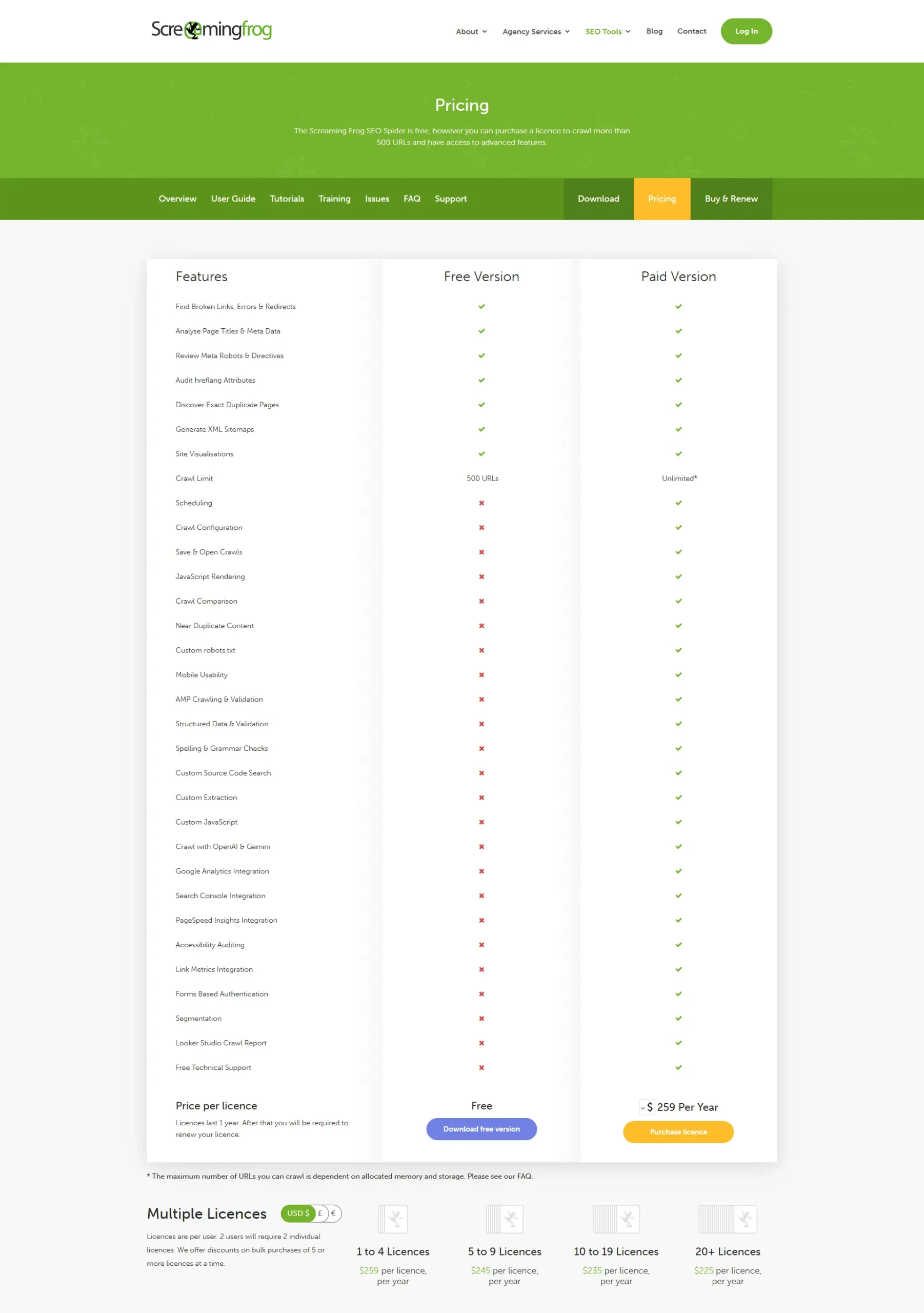
Features & Functionality
General Features
Screaming Frog SEO Spider is packed with a variety of powerful features designed to help SEO professionals, digital marketers, and webmasters conduct thorough technical SEO audits. Below is a breakdown of its key features, their functionalities, and how they contribute to improving SEO performance.
Comprehensive Website Crawling
- What it Does: Crawls an entire website, following internal and external links to identify SEO issues.
- Why It Matters: Ensures all pages, redirects, and assets (CSS, JS, images, etc.) are accounted for, providing an in-depth structural analysis of a website.
- SEO Benefit: Helps uncover hidden pages, orphan pages (not linked internally), and issues affecting site indexation.
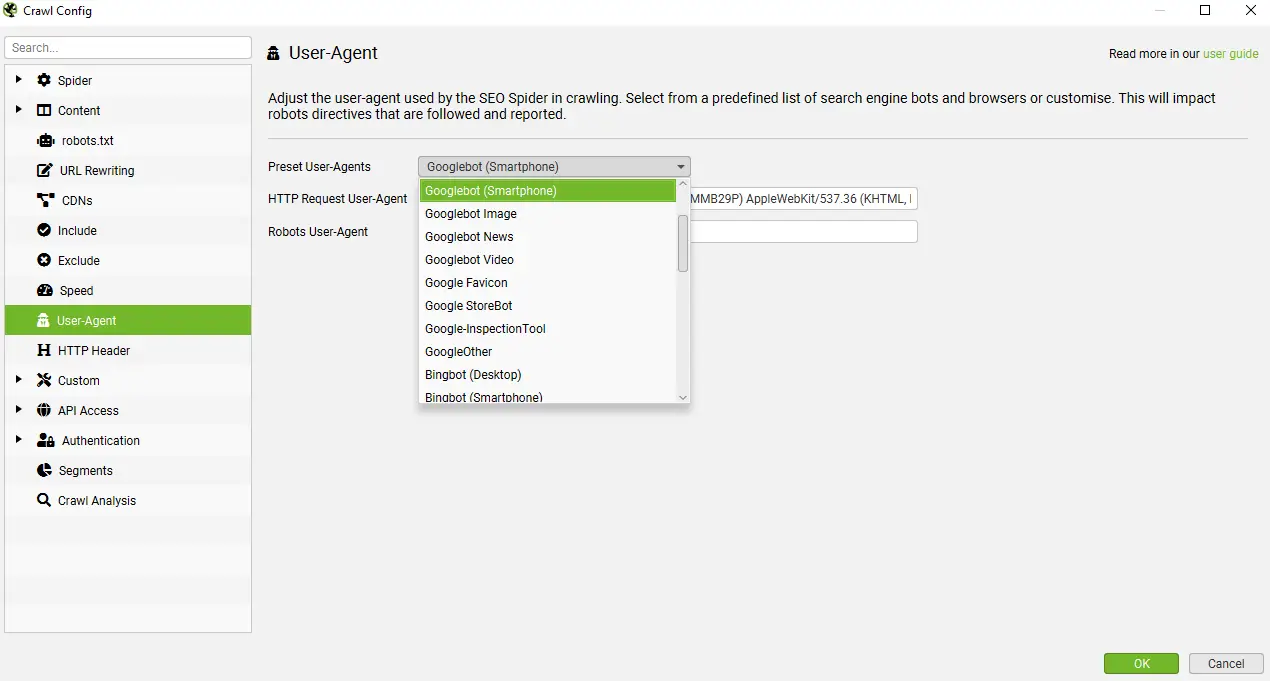
Broken Link Detection
- What it Does: Identifies broken links (404 errors, server issues) across a website.
- Why It Matters: Dead links hurt user experience and search engine crawlability.
- SEO Benefit: Fixing broken links ensures smooth navigation, improves site health, and reduces bounce rates.
Page Title & Meta Description Analysis
- What it Does: It extracts all page titles and meta descriptions and their lengths to check for missing, duplicate, or improperly optimized content.
- Why It Matters: Poorly written or duplicate meta tags can negatively impact CTR (Click-Through Rate) and rankings.
- SEO Benefit: Enables bulk editing of meta tags, ensuring every page is properly optimized for search engines and users.
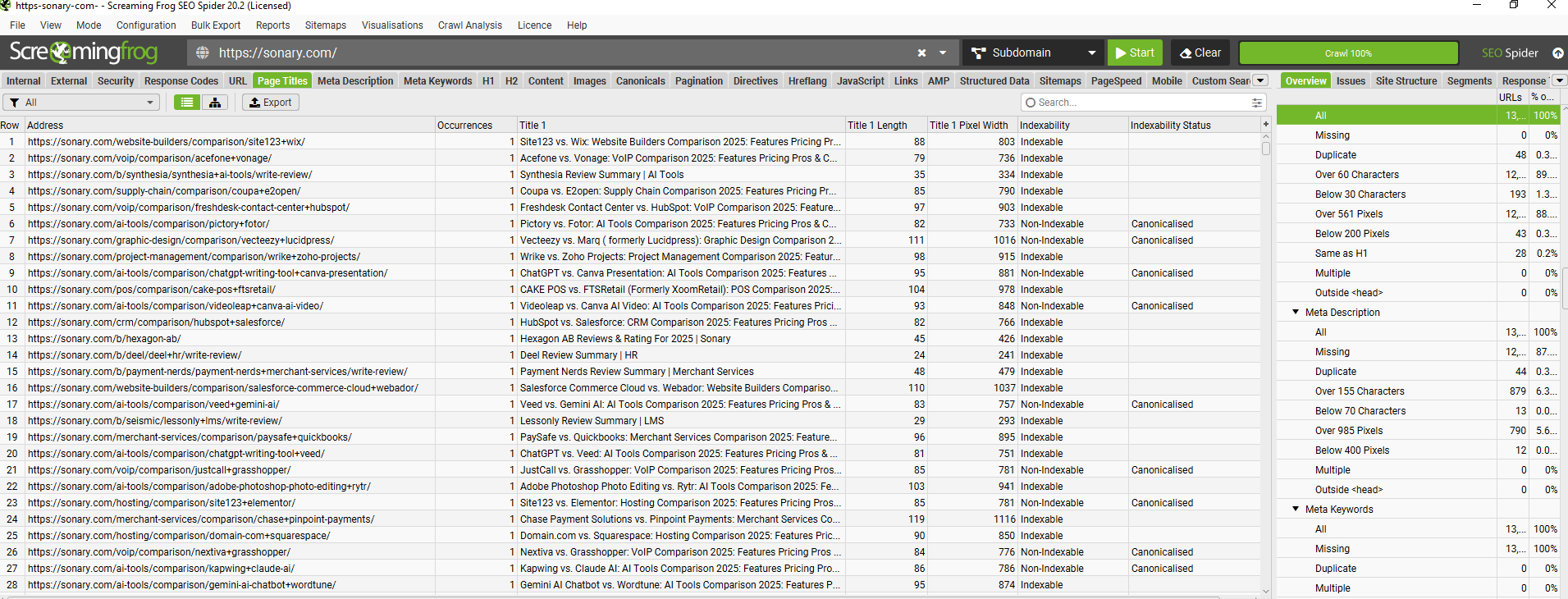
Duplicate Content & Canonical Tag Checking
- What it Does: Detects identical or near-duplicate pages and verifies correct implementation of canonical tags.
- Why It Matters: Duplicate content confuses search engines and can result in ranking penalties.
- SEO Benefit: Helps webmasters consolidate duplicate pages using canonical tags or redirects, ensuring proper indexing of the preferred version.
XML Sitemap Generation
- What it Does: Automatically creates XML sitemaps for search engines.
- Why It Matters: Search engines rely on XML sitemaps to crawl and index pages efficiently.
- SEO Benefit: Helps Google and other search engines find and index new and updated pages faster, improving visibility.
Robots.txt & Noindex Detection
- What it Does: Identifies pages blocked by robots.txt or tagged with “noindex.”
- Why It Matters: Critical pages being mistakenly blocked from indexing can lead to traffic loss.
- SEO Benefit: Ensures the correct pages are accessible to search engines while preventing low-value pages from being indexed.
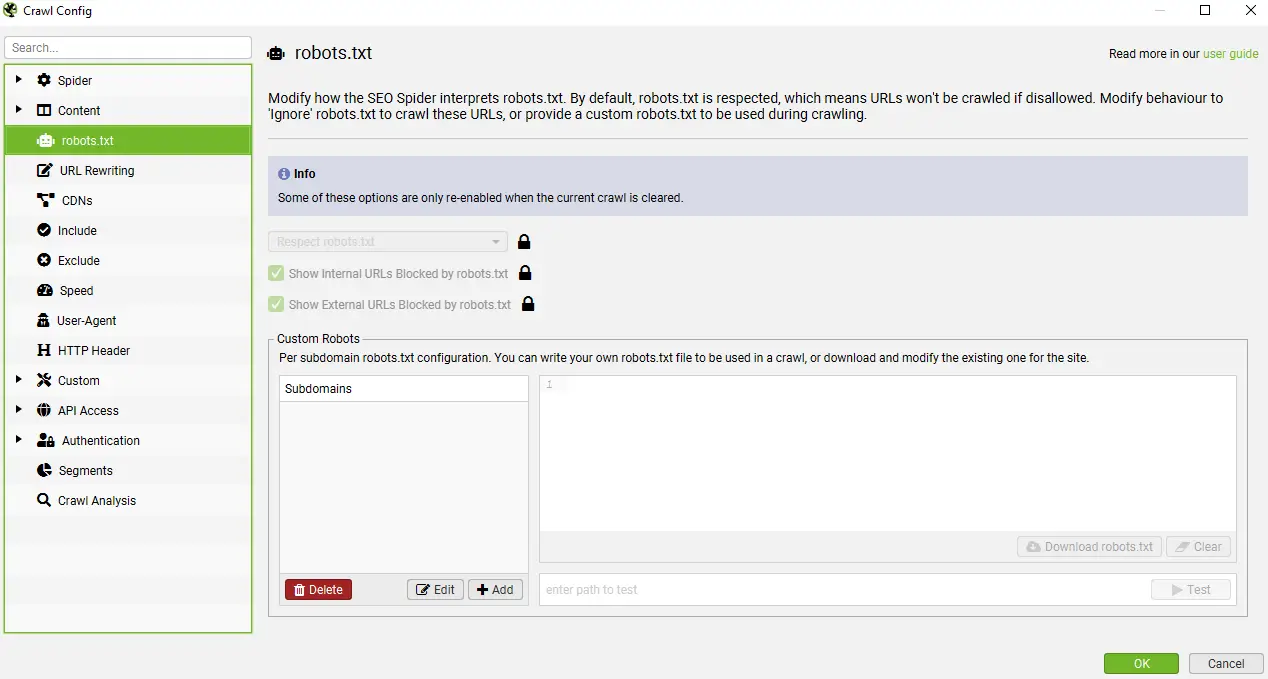
Redirect & HTTP Status Code Analysis
- What it Does: Checks for temporary (302) and permanent (301) redirects, as well as error pages (4xx, 5xx).
- Why It Matters: Improper redirects can dilute link equity and hurt user experience.
- SEO Benefit: Ensures redirects are implemented correctly to maintain SEO value and prevent broken pathways.
Custom Extraction (XPath, CSS Path, Regex)
- What it Does: Extracts specific on-page elements (e.g., schema markup, Open Graph tags, analytics codes).
- Why It Matters: Enables users to track critical page elements efficiently.
- SEO Benefit: Helps optimize structured data, ensuring better rich snippet eligibility in SERPs.
JavaScript Rendering
- What it Does: Renders JavaScript-heavy websites and extracts SEO data from dynamically loaded content.
- Why It Matters: Some websites (e.g., Single Page Applications) rely on JavaScript to load content, which standard crawlers may not capture.
- SEO Benefit: Ensures that search engines properly crawl and index JavaScript-based pages.
Google Analytics & Search Console Integration
- What it Does: Pulls additional data from Google Analytics and Google Search Console.
- Why It Matters: Combines Screaming Frog’s crawl data with real user interaction data.
- SEO Benefit: Helps pinpoint high-impression but low-click pages, revealing optimization opportunities.
Site Architecture Visualization
- What it Does: Provides visual representations of a site’s internal linking and structure.
- Why It Matters: Poor site structure can lead to inefficient search engine crawling and indexation issues.
- SEO Benefit: Helps optimize internal linking, ensuring that important pages get the necessary link authority.
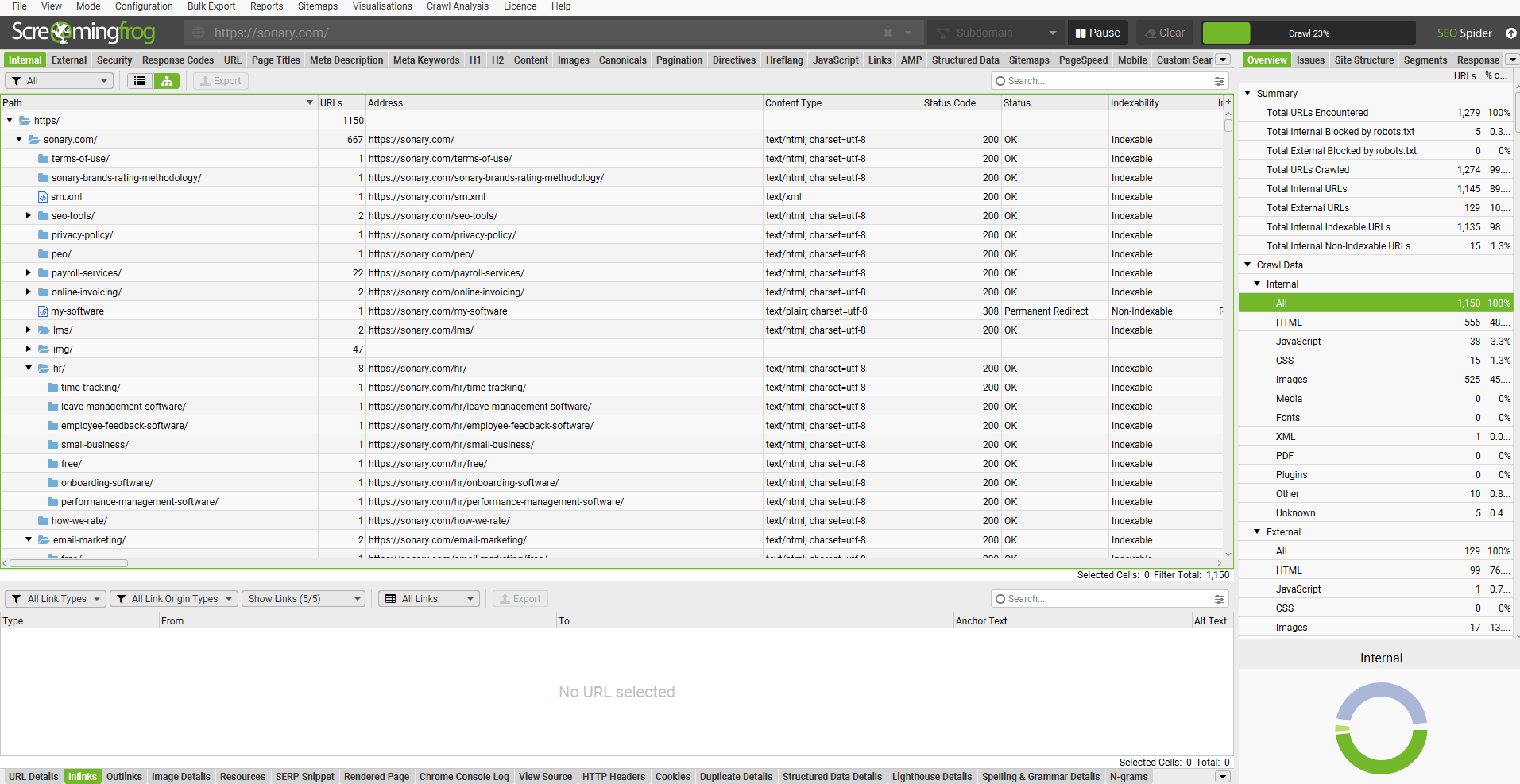
PageSpeed Insights Integration
- What it Does: Fetches PageSpeed scores and insights directly within Screaming Frog.
- Why It Matters: Site speed is a major ranking factor for Google.
- SEO Benefit: Helps identify slow-loading pages, allowing webmasters to optimize performance for better rankings.
Internal & External Link Analysis
- What it Does: Examines how internal and external links are structured across the site.
- Why It Matters: Poor internal linking can affect crawl efficiency and page authority distribution.
- SEO Benefit: Helps improve link structure, ensuring pages receive adequate internal linking for better SEO performance.
Mobile vs. Desktop Crawling
- What it Does: Allows switching between desktop and mobile user agents for crawling.
- Why It Matters: Google prioritizes mobile-first indexing.
- SEO Benefit: Ensures mobile and desktop versions of a site are optimized correctly for search engines.
Hreflang Tag Validation
- What it Does: Checks for proper implementation of hreflang tags for multilingual and multi-regional sites.
- Why It Matters: Incorrect hreflang tags can cause incorrect language versions to rank in different regions.
- SEO Benefit: Helps optimize international SEO strategies for better rankings in multiple countries.
Structured Data (Schema Markup) Validation
- What it Does: Identifies missing or incorrect schema markup.
- Why It Matters: Structured data enhances rich results in search engines (e.g., star ratings, FAQs, breadcrumbs).
- SEO Benefit: Ensures proper implementation of schema markup, improving CTR and visibility in SERPs.
Why Screaming Frog SEO Spider is a Must-Have for SEO Audits
- Pinpoints Critical SEO Errors: Instantly detects broken links, duplicate content, and other ranking issues.
- Enhances Website Indexation: Ensures search engines can efficiently crawl and index pages.
- Improves Page Optimization: Offers insights to refine meta tags, headings, and structured data.
- Strengthens Internal Linking: Helps optimize site architecture for better user experience and rankings.
- Boosts Technical SEO Insights: Advanced features like log file analysis and JavaScript rendering provide deeper SEO intelligence.
Screaming Frog SEO Spider – Integration Guide
1. Website Platforms & CMS
Screaming Frog is platform-agnostic – it works with any website because it crawls URLs directly, not through platform-specific plugins.
-
Supports WordPress, Shopify, Wix, Squarespace, Magento, Drupal, and more.
-
You simply enter your website URL, and the tool crawls it like a search engine would.
-
For WordPress users, it pairs well with SEO plugins like Yoast or Rank Math for deeper analysis.
2. Analytics & Tracking Tools
Screaming Frog can integrate directly with:
-
Google Analytics (GA4) – pull traffic and engagement data into your crawl reports.
-
Google Search Console – import impressions, clicks, CTR, and position data alongside crawl insights.
-
Helps you connect SEO performance with technical crawl issues.
3. SEO APIs & Data Sources
For advanced users, Screaming Frog can connect to multiple APIs to enhance data:
-
PageSpeed Insights API – fetch Core Web Vitals data for every URL.
-
Ahrefs, Moz, Majestic – import backlink metrics into your crawl results.
-
Link Metrics APIs – see authority scores and link data while reviewing your site structure.
4. Data Export & Reporting
Screaming Frog integrates seamlessly with spreadsheet and BI tools:
-
Excel & Google Sheets – export crawl data for filtering, pivot tables, and client reports.
-
Data Studio / Looker Studio – connect exported data for dashboard visualization.
-
CSV, TSV, XLSX exports for easy sharing and offline analysis.
5. CMS & Development Workflow
While it doesn’t “plug in” directly to CMS editing screens, Screaming Frog fits into development workflows by:
-
Exporting broken links, duplicate content, and redirect chains to share with developers.
-
Generating XML sitemaps that can be uploaded to your CMS or Search Console.
-
Identifying missing meta tags and structured data for content teams to fix in the CMS.
6. Automation & Scheduling
For recurring site checks:
-
Command-Line Interface (CLI) allows automated crawls and exports.
-
Can be integrated with Jenkins, GitHub Actions, or other automation tools for regular SEO health checks.
-
Useful for agencies and in-house teams managing multiple sites.
Performance:
The SEO Spider is renowned for its speed and efficiency in crawling websites of varying sizes. It provides real-time data analysis, allowing users to identify and address SEO issues promptly. The tool’s performance is particularly notable when handling large-scale sites, offering comprehensive insights without significant delays.
One of the most impressive aspects of Screaming Frog is its blazing-fast crawling speed. I’ve used it on websites with over 100,000 URLs, and it handled the job smoothly without crashing. Unlike cloud-based tools, Screaming Frog runs locally on your machine, ensuring faster data retrieval and immediate analysis.
Ease Of Use:
At first glance, the interface may seem overwhelming, especially for beginners. However, after spending some time with it, I found it to be incredibly intuitive. The tab-based structure makes it easy to navigate between issues like redirects, duplicate content, and indexing problems. For advanced users, the ability to customize crawls ensures flexibility and deeper insights.
Uniqueness:
Screaming Frog SEO Spider distinguishes itself with its deep crawling capabilities and advanced features such as JavaScript rendering and custom extraction. Its ability to integrate with multiple analytics platforms and provide detailed, customizable reports makes it a valuable asset for technical SEO audits.
Verdict:
Screaming Frog SEO Spider is an indispensable tool for SEO professionals seeking a thorough and efficient website analysis solution. Its blend of comprehensive features, performance efficiency, and integration capabilities make it a standout choice for technical SEO audits. While there may be a learning curve for beginners, the depth of insights provided justifies the investment in time and resources.
Screaming Frog SEO Spider is a desktop-based website crawling tool designed to mimic search engine bots and identify technical SEO issues. Whether you’re looking to analyze a small website or crawl a massive enterprise site, this tool provides comprehensive SEO data in real time. From detecting broken links to auditing metadata, it gives SEO professionals unparalleled control over their audits.

